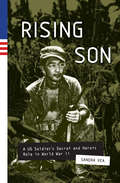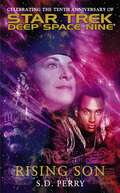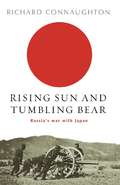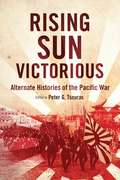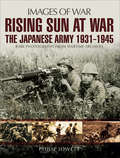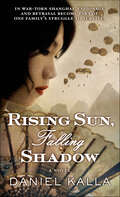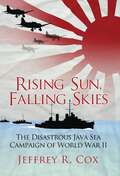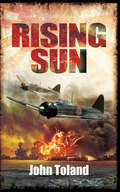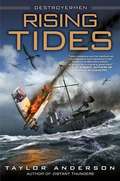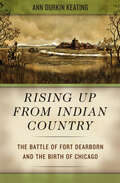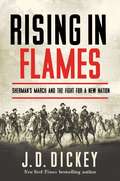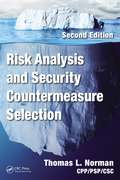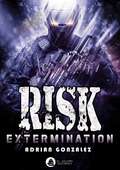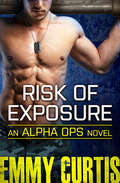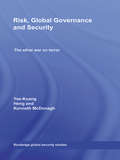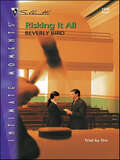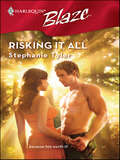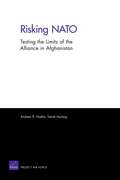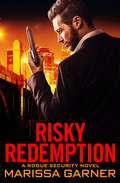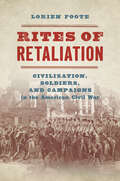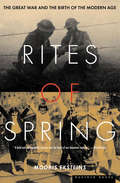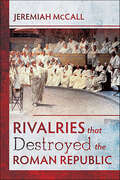- Table View
- List View
Rising Son: A US Soldier's Secret and Heroic Role in World War II
by Sandra VeaThe remarkable story of a Japanese American who served in a top-secret team in World War II that coaxed Japanese Imperial soldiers from their bunkers on the front lines of the war in the Pacific.Masao Abe was a second-generation Japanese American who was swept up in the momentum of history during World War II. Born in southern California but educated as a teenager in Japan during the 1930s, he returned to the US and was drafted into the US Army. As he completed basic training, the attack on Pearl Harbor put his military career in limbo because the US government didn't know what to do with him or how to think about him--was he an enemy or a patriot? Masao was eventually recruited to join the secretive Military Intelligence Service: he was trained to accompany American soldiers as they fought their way across the islands in the Pacific. His assignment was to convince Japanese Imperial soldiers to lay down their arms, and to read captured documents looking for enemy strategies. He went to war with a bodyguard because his commanders knew he wore a target on his front and his back. This little-known slice of history reveals how the confluence of race, war, and loyalty played out when the nation called for the service of those it judged most harshly.
Rising Son: Star Trek Deep Space Nine (Star Trek: Deep Space Nine)
by S.D. PerryFrom the author of Avatar (I & II) and Section 31: Cloak, this intense story reveals the much-anticipated fate of Jake Sisko, missing since Avatar Book Two, as well as the long-awaited return of someone missing since the first season of Star Trek: Deep Space Nine...Months ago, young Jake Sisko came upon a mysterious prophecy in the ruins of B'hala, one that told of a Son destined to enter the Celestial Temple of the Prophets and return home with a lost Herald. Certain that the ancient text was intended for him, Jake entered the wormhole to bring back his father, Captain Benjamin Sisko—missing since his final, fateful confrontation with Gul Dukat in the Fire Caves of Bajor. But Jake's quest has failed. Or so he believes. Flung across the galaxy by a power beyond his understanding, Jake is rescued by a strange ship with an even stranger alien crew. Joining them on a voyage unlike any he has ever experienced, Jake learns that his search for the truth will lead him to find the last thing he ever expected, and to discoveries far beyond his wildest imaginings.
Rising Summer: the perfect happy and wholesome novel to escape with
by Mary Jane StaplesAre you looking for an engaging novel with a warm sense of humour and loveable characters? Mary Jane Staples has provided just that. Perfect for fans of Maggie Ford, Kitty Neale and Katie Flynn.READERS ARE LOVING TWO FOR THREE FARTHINGS'Brilliantly written, I couldn't put it down' - 5 STAR REVIEW'Another well written and observed story' - 5 STAR REVIEW'Another great story by Mary Jane Staples' - 5 STAR REVIEW*********************************************************AS WAR CONTINUES, WILL LOVE BLOOM?Tim Parkes was three when his parents were killed in a train crash and he went to live with his Aunt May. They managed splendidly - and then came the war.When Tim enlists and is posted to Suffolk, he isn't too pleased - Suffolk is Country, not like South London at all. But the City had followed him in the shape of evacuees, and those of them that weren't creating havoc in the Suffolk village were creating havoc in Tim's life.Minnie Beavers - ex-Camberwell - was fifteen, pert, pretty, and wildly in love with Tim. She was determined to marry him the minute she was old enough. Tim was equally determined to escape and find another girl.By the time Tim had gone away to fight and Minnie had joined the WAAF, a great many things had changed in both their lives...
Rising Sun And Tumbling Bear: Russia's War with Japan
by Richard ConnaughtonThe definitive history of the Russo-Japanese warThe Russians were wrong-footed from the start, fighting in Manchuria at the end of a 5,000 mile single track railway; the Japanese were a week or so from their bases. The Russian command structure was hopelessly confused, their generals old and incompetent, the Tsar cautious and uncertain. The Russian naval defeat at Tsushima was as farcical as it was complete. The Japanese had defeated a big European power, and the lessons for the West were there for all to see, had they cared to do so. From this curious war, so unsafely ignored for the most part by the military minds of the day, Richard Connaughton has woven a fascinating narrative to appeal to readers at all levels.
Rising Sun And Tumbling Bear: Russia's War with Japan (CASSELL MILITARY PAPERBACKS)
by Richard ConnaughtonThe definitive history of the Russo-Japanese warThe Russians were wrong-footed from the start, fighting in Manchuria at the end of a 5,000 mile single track railway; the Japanese were a week or so from their bases. The Russian command structure was hopelessly confused, their generals old and incompetent, the Tsar cautious and uncertain. The Russian naval defeat at Tsushima was as farcical as it was complete. The Japanese had defeated a big European power, and the lessons for the West were there for all to see, had they cared to do so. From this curious war, so unsafely ignored for the most part by the military minds of the day, Richard Connaughton has woven a fascinating narrative to appeal to readers at all levels.
Rising Sun Victorious: Alternate Histories of the Pacific War
by Peter G. Tsouras<P> In war, victory can be held hostage to seemingly insignificant incidents-chance events, opportunities seized or cast aside-that can derail the most brilliant military strategies and change the course of history. What if the Japanese had conquered India and driven out the British? What if the strategic link between the United States and Australia had been severed? What if Vice Admiral Nagumo had launched a third attack on Pearl Harbor? What if the U. S. Navy’s gamble at Midway had backfired? <P> Ten leading military historians ask these and other questions in this fascinating book. The war with Japan was rife with difficult choices and battles that could have gone either way. These fact-based alternate scenarios offer intriguing insights into what might have happened in the Pacific during World War II, and what the consequences would have been for America.
Rising Sun at War: The Japanese Army, 1931–1945 (Images of War)
by Philip JowettThe Japanese Imperial Army was the most powerful force in the Far East through the 1930s and early 1940s, and this photographic history is the ideal introduction to it. In a vivid selection of archive images, most of which have not been published before, Philip Jowett covers its role in a series of conflicts, beginning with its invasion of Manchuria in 1931 until its final defeat in the Pacific War in August 1945. He describes the development of the army, its structure and organization and its expansion during these years, and illustrates its actions in a series of campaigns that are often overlooked in other books on the subject, including those in China between 1931 and 1937 and the Nomonhan campaign against the Soviet Union in 1938. The extraordinary ambition of the Japanese military during these years is dramatically revealed through the photographs and the accompanying text, and the book provides a graphic record of the Japanese armys performance against the opposing forces that were eventually ranged against it the Chinese, British, Soviets and Americans.
Rising Sun, Falling Shadow: A Novel (Shanghai Series #2)
by Daniel KallaReturn to World War II Shanghai in Dan Kalla's thrilling historical novel Rising Sun, Falling Shadow, the sequel to The Far Side of the SkyIt's 1943 and the Japanese juggernaut has swallowed Shanghai and the rest of eastern China, snaring droves of American and British along with thousands of "stateless" German Jewish refugees. Despite the hostile environs, newlyweds Dr. Franz Adler and his wife, Sunny, adjust to life running the city's only hospital for refugee Jews.Bowing to Nazi pressure, the Japanese force twenty thousand Jewish refugees, including the Adlers, to relocate to a one-square-kilometer "Shanghai Ghetto." Heat, hunger, and tropical diseases are constant threats. But the ghetto also breeds miraculous resilience. Music, theater, sports, and Jewish culture thrive despite what are at times subhuman conditions. Navigating subversion and espionage, Nazi treachery and ever-worsening conditions while living under the heel of the Japanese military, the Adlers struggle to keep the hospital open and their family safe and united.At the Publisher's request, this title is being sold without Digital Rights Management Software (DRM) applied.
Rising Sun, Falling Skies
by Jeffrey CoxA fresh look at the disastrous Java Sea Campaign of 1941-42 which heralded a wave of Japanese naval victories in the Pacific but which eventually sowed the seeds of their eventual change in fortunes. In the immediate aftermath of Pearl Harbor, the Japanese juggernaut quickly racked up victory after victory. Desperate to secure resource-rich regions in the Pacific and ensure their continued dominance of South East Asia, Japanese forces were determined in their efforts to conquer Malaya, Singapore and the oil-rich islands around Java Sea - Borneo, Sumatra and Java itself. In the face of this seemingly unstoppable tide stood a small Allied force - American, Australian, British and Dutch. Thrown together by circumstance; cut off from reinforcements or in many cases retreat; operating with old, obsolete equipment and dwindling supplies, there was little hope of victory. Indeed, the month-long Java Sea Campaign, as it subsequently became known, quickly evolved from a traditional test of arms into a test of character. In the face of a relentless enemy and outnumbered, outgunned and alone, they defiantly held on, attempting to buy weeks, days, even hours until a better line of defense - and offense - could be established. These were the men of the US Asiatic Feet, the British Far Eastern Fleet, the Royal Netherlands Navy's East Indies Squadron and the Royal Australian Navy. And their supporting units like Patrol Wing Ten, the Royal Netherlands Naval Air Service, the US Army Air Force's 17th Pursuit Squadron and submarines of all these fine nations. A campaign that has been too often either ignored by historians or criticised for poor command decisions, this is the story of the sailors and the airmen at the sharp end, and how they fought and endured the first months of the War in the Pacific.
Rising Sun: The Decline And Fall Of The Japanese Empire, 1936-1945 (Modern Library War Ser.)
by John TolandThis magnificent Pulitzer Prize-winning history, told primarily from the Japanese viewpoint, traces the dramatic fortunes of the Empire of the Sun from the invasion of Manchuria to the dropping of the atomic bombs, demolishing many myths surrounding this catastrophic conflict. Why did the dawn attack on Pearl Harbor occur? Was was inevitable? Was the Emperor a puppet or a warmonger? And, finally, what inspired the barbaric actions of those who fought, and who speak here of the unspeakable - murder, cannibalism and desertion?
Rising Tides (Destroyermen, Book #5)
by Taylor AndersonAs Lieutenant Commander Matthew Reddy and the crew of USS Walker continue their battle for both freedom and survival, the stakes become much more personal .... Reddy has found an unlikely but invaluable ally in Commodore Jenks of the New Britain Imperial Navy. And now they are united in their desire to hunt down the traitor who abducted two women both men would die to protect: Reddy's love, nurse Sandra Tucker, and young Princess Rebecca of the New British Empire. However, this battle will not be fought with broadsides and broadswords, but with cunning and intrigue. For when Reddy and Jenks report the situation to the New Britain Company, they are met with scorn and disbelief. It soon becomes obvious that the ruthless Company is attempting to overthrow the Imperial Throne--and that someone involved knows where Sandra and Rebecca are. From the halls of power to the ballrooms of the nobility, Reddy must navigate through a tempest of politics, deception, and betrayal if he is ever going to save the hostages and live to fight another day ....
Rising Up from Indian Country: The Battle of Fort Dearborn and the Birth of Chicago
by Ann Durkin Keating&“Sets the record straight about the War of 1812&’s Battle of Fort Dearborn and its significance to early Chicago&’s evolution . . . informative, ambitious&” (Publishers Weekly). In August 1812, Capt. Nathan Heald began the evacuation of ninety-four people from the isolated outpost of Fort Dearborn. After traveling only a mile and a half, they were attacked by five hundred Potawatomi warriors, who killed fifty-two members of Heald&’s party and burned Fort Dearborn before returning to their villages. In the first book devoted entirely to this crucial period, noted historian Ann Durkin Keating richly recounts the Battle of Fort Dearborn while situating it within the nearly four decades between the 1795 Treaty of Greenville and the 1833 Treaty of Chicago. She tells a story not only of military conquest but of the lives of people on all sides of the conflict, highlighting such figures as Jean Baptiste Point de Sable and John Kinzie and demonstrating that early Chicago was a place of cross-cultural reliance among the French, the Americans, and the Native Americans. This gripping account of the birth of Chicago &“opens up a fascinating vista of lost American history&” and will become required reading for anyone seeking to understand the city and its complex origins (The Wall Street Journal). &“Laid out with great insight and detail . . . Keating . . . doesn&’t see the attack 200 years ago as a massacre. And neither do many historians and Native American leaders.&” —Chicago Tribune &“Adds depth and breadth to an understanding of the geographic, social, and political transitions that occurred on the shores of Lake Michigan in the early 1800s.&” —Journal of American History
Rising in Flames: Sherman's March And The Fight For A New Nation
by J. D. DickeyA New York Times bestselling historian sheds new light on Sherman’s epic “March to the Sea,” especially the soldiers, doctors, nurses, and civilians who would change the nation for the better. America in the antebellum years was a deeply troubled country, divided by partisan gridlock and ideological warfare, angry voices in the streets and the statehouses, furious clashes over race and immigration, and a growing chasm between immense wealth and desperate poverty. The Civil War that followed brought America to the brink of self-destruction. But it also created a new country from the ruins of the old one—bolder and stronger than ever. No event in the war was more destructive, or more important, than William Sherman’s legendary march through Georgia—crippling the heart of the South’s economy, freeing thousands of slaves, and marking the beginning of a new era. This invasion not only quelled the Confederate forces, but transformed America, forcing it to reckon with a century of injustice. Dickey reveals the story of women actively involved in the military campaign and later, in civilian net- works. African Americans took active roles as soldiers, builders, and activists. Rich with despair and hope, brutality and compassion, Rising in Flames tells the dramatic story of the Union’s invasion of the Confederacy, and how this colossal struggle helped create a new nation from the embers of the Old South.
Risk Analysis and Security Countermeasure Selection
by Thomas L. Norman CPP/PSP/CSCThis new edition of Risk Analysis and Security Countermeasure Selection presents updated case studies and introduces existing and new methodologies and technologies for addressing existing and future threats. It covers risk analysis methodologies approved by the U.S. Department of Homeland Security and shows how to apply them to other organizations
Risk Extermination: There is not anything to translate. (There is not anything to translate. #1)
by Adrián GonzalezChapter 1 I make a triumphal entry into the first room of the headquarters. Headquarters of the platoon two four five, in the Earth space. Although the operation was on a large scale banishing of the Tungs migration from the moon, the soldiers welcome me cheerfully, acclaiming only my name. I knew that the rumor would spread quickly and I kept hearing the exaggerated murmurs of the feat. "They say he killed over a hundred Tungs and destroyed the fort on his own," I heard one say. "They claim in our squad that he killed a thousand Tungs and a queen." Another soldier interrupted them. He did more than that, he took the colony by himself. The deed had been quite a feat in the hostile field of the third moon, but the rumors were ridiculous and exaggerated. I could not deny them or give them the truth that I should, morale was through the roof and I would not be the one to say that our casualties were as many as theirs. Despite this, we recovered territory by rolling back the enemy and that was a great victory for humanity. -Attention! Officer in the area,” a low ranking soldier shouted. We stayed still in front of the sergeant first. A thin man, of mature age, gray-haired and in good condition. Together with the ten men from my platoon, I made the corresponding salute. We struck the heel in unison while at the same time bringing the hand at a forty-five degree angle to the forehead. "Very good job soldiers, I congratulate you on taking key territory in the war against the Tungs," said the sergeant, after a brief pause he continued. In two hours we will pay our respects to the fallen and to our hero commemorated with three medals. We saluted loudly, they gave the order to break formation and we moved to our rooms. Mine was empty, I had lost my three companions, lifelong friends where we shared everything. The sadness came from the depths derailing through the eyes. Pietro had fallen in the first week,
Risk of Exposure (Alpha Ops #6)
by Emmy CurtisHe is a trained professional-but nothing can prepare him for the hottest mission of his life. Assigned to protect his boss's daughter, British former SAS operative Malone Garrett breaks the first rule of covert surveillance-don't make contact. And especially don't take your mark out to dinner, then agree to a rooftop quickie. But now that Mal has Abby in his arms, he has no intention of ever letting her go. Abby Baston told herself it was a hit and quit, a one-nighter with a hot, handsome stranger whose hands were trained to take action. Working undercover for the CIA, she can't risk anything more. But when an international crisis ignites, Abby must make a call: trust Mal with her secret-and her heart-and partner up, or lose everything in a split second . . . More in the Alpha Ops seriesDANGEROUS TERRITORY (novella)OVER THE LINEPUSHING THE LIMITBLOWBACKCOMPROMISED
Risk, Global Governance and Security: The Other War on Terror (Routledge Global Security Studies)
by Yee-Kuang Heng Ken McDonaghThis book applies risk society theory to the 'War on Terror', steering the discussion away from the militaristic discourse of the Bush era towards an emphasis on global cooperation and a new cosmopolitan agenda. The literature and rhetoric of the 'War on Terror' has been dominated by dramatic high-profile military campaigns and division in the international community. This overlooks the various multilateral practices and cooperative processes that are emerging to combat global terrorism. President Bush himself had initially been at pains to stress that his 'war' on terror would be like no other; it would involve not just military tools but financial, intelligence, police and diplomatic measures too. More than eight years later, the time is right for an in-depth evaluation of this 'other' war on terror. Yet these relatively mundane regulatory dimensions have received much less attention than the 'hot' wars in Afghanistan and Iraq, where ongoing difficulties suggest that military force alone is inadequate in controlling globalised terrorism. This book aims to redress this imbalance, by foregrounding these initiatives, tracing their implementation and reflecting on the implications for International Relations. Adopting an analytical approach that seeks to incorporate theories of risk, global governance and security, this book aims to explore the overlapping multi-level and multi-lateral dynamics of the emerging global security architecture which have remained neglected and unmapped thus far in the war on terror. This book will be of interest to students of risk politics, security studies, global governance and IR in general. Yee-Kuang Heng is Lecturer in International Relations, University of St Andrews, UK. Kenneth McDonagh is Lecturer in International Relations in the School of Law and Government, Dublin City University.
Risking It All
by Beverly BirdThis was the case that could make or break Grace Simkanian's career as a defense attorney, but her client, Aidan McKenna, wasn't making it easy for her. The charming cop enjoyed provoking and challenging her--inspiring emotions that were anything but professional. Grace was determined to win this case, but would she lose her heart in the process?Framed for extortion and set on proving his innocence, Aidan was forced to depend on the sleek, sophisticated Grace to help him find out who was behind the frame-up. His lady lawyer was pure temptation, and he yearned to set her cool demeanor on fire. But would putting his trust in Grace ultimately be Aidan's downfall?
Risking It All
by Stephanie TylerWhat is it about extreme surfer John 'Cash' Cashman?Ambitious documentarian Rina Calhoun has filmedrisk-taking sports enthusiasts before, but she's nevermade a private tape of one of these bad boys…. And itturns out the daring, hot movie version's got nothingon the real thing! But Rina's X-treme documentary is turning into anX-asperating docudrama, since Cash won't sign herrelease form. No paper from him, no big break for her.Cash wants to help the fiery little number behind thelens, but he can't because his secret life as a navy SEALhas him deep undercover. Yet as Rina stumbles into theline of fire, all bets are quickly off. He's risking everythingto save her. But will it be enough?
Risking It All: A Naked Men Novel (Naked Men #1)
by Christi BarthWho doesn't love Naked Men? In Christi Barth's irresistible series, a group of close-knit friends talk out their problems with naked honesty on a popular blog. Bonded by a high-school tragedy, they're moving on from the past--and fighting for the future with strong and sassy women. Griffin Montgomery helps people. As a teenager, he kept his best friends alive after their soccer team's bus crashed in the Alps. Now, as a Coast Guard search and rescue pilot, he saves lives with reckless abandon--until he goes too far and earns a lengthy suspension. Working on the Naked Men projects keeps his mind busy, but Griff's itching to get back in the action. That's when he finds his latest rescue mission: a pretty wallflower who's stuck in her comfort zone. Chloe Widmore doesn't take risks. As a professional letter writer, she gets enough excitement out of expressing other people's emotions. So when the hottest man she's ever seen invades her coffee shop, Chloe surprises herself with how much she wants to be with him. Routines make her feel safe. Griff makes her deliciously unsafe, in so many ways. But falling for him is one risk she might just have to take . . . whether she's ready or not. Includes a special message from the editor, as well as an excerpt from another Loveswept title.
Risking NATO
by Andrew R. Hoehn Sarah HartingNATO's success in Afghanistan--or lack thereof--will have significant implications for the alliance itself. The authors examine the current mission in light of NATO's history and with an eye toward the future. NATO faces a long and daunting list of issues that extends beyond the borders of the member countries. The alliance must confront them, however, because failure to do so would risk its long-term success and sustainability.
Risky Redemption (Rogue Security #1)
by Marissa GarnerFour years ago, Angela Reardon was brutally attacked, and she still bears the physical scars and traumatic memories. While she's worked hard to overcome her fears and build a successful business, she's still haunted by her inability to identify her assailant. Now Angela only wants to be left alone-until a shadowy stranger reignites her desire to be loved. But their time together may be brief...because someone wants her dead.CIA assassin Jake Stone's targets deserved to die. Until now. Until he falls in love with the innocent woman he's been hired to kill. Jake can't fight his attraction to Angela, and he knows that someone else will be sent to finish the job. So can he save Angela and redeem himself by uncovering who wants her killed? When the trail leads him into the carnal underbelly of L.A., the truth is more shocking than even he could ever imagine.
Rites of Retaliation: Civilization, Soldiers, and Campaigns in the American Civil War (The Steven and Janice Brose Lectures in the Civil War Era)
by Lorien FooteDuring the Civil War, Union and Confederate politicians, military commanders, everyday soldiers, and civilians claimed their approach to the conflict was civilized, in keeping with centuries of military tradition meant to restrain violence and preserve national honor. One hallmark of civilized warfare was a highly ritualized approach to retaliation. This ritual provided a forum to accuse the enemy of excessive behavior, to negotiate redress according to the laws of war, and to appeal to the judgment of other civilized nations. As the war progressed, Northerners and Southerners feared they were losing their essential identity as civilized, and the attention to retaliation grew more intense. When Black soldiers joined the Union army in campaigns in South Carolina, Georgia, and Florida, raiding plantations and liberating enslaved people, Confederates argued the war had become a servile insurrection. And when Confederates massacred Black troops after battle, killed white Union foragers after capture, and used prisoners of war as human shields, Federals thought their enemy raised the black flag and embraced savagery.Blending military and cultural history, Lorien Foote's rich and insightful book sheds light on how Americans fought over what it meant to be civilized and who should be extended the protections of a civilized world.
Rites of Spring: The Great War and the Birth of the Modern Age
by Modris EksteinsThis award-winning cultural history reveals how the Great War changed humanity. This sweeping volume probes the origins, the impact, and the aftermath of World War I—from the premiere of Igor Stravinsky&’s ballet The Rite of Spring in 1913 to the death of Hitler in 1945. &“The Great War,&” as Modris Eksteins writes, &“was the psychological turning point . . . for modernism as a whole. The urge to create and the urge to destroy had changed places.&” In this &“bold and fertile book&” (The Atlantic Monthly), Eksteins goes on to chart the seismic shifts in human consciousness brought about by this great cataclysm, through the lives and words of ordinary people, works of literature, and such events as Lindbergh&’s transatlantic flight and the publication of the first modern bestseller, All Quiet on the Western Front. Rites of Spring is a rare and remarkable work, a cultural history that redefines the way we look at our past—and toward our future.
Rivalries that Destroyed the Roman Republic
by Jeremiah McCallThis is the story of how some Roman aristocrats grew so competitive in their political rivalries that they destroyed their Republic, in the late second to mid-first century BCE. Politics had always been a fractious game at Rome as aristocratic competitors strove to outshine one another in elected offices and honors, all ostensibly in the name of serving the Republic. And for centuries it had worked - or at least worked for these elite and elitist competitors. Enemies were defeated, glory was spread round the ruling class, and the empire of the Republic steadily grew. When rivalries grew too bitter, when aristocrats seemed headed toward excessive power, the oligarchy of the Roman Senate would curb its more competitive members, fostering consensus that allowed the system—the competitive arena for offices and honors, and the domination of the Senate—to continue. But as Rome came to rule much of the Mediterranean, aristocratic competitions grew too fierce; the prizes for winning were too great. And so, a series of bitter rivalries combined with the social and political pressures of the day to disintegrate the Republic. This is the story of those bitter rivalries from the senatorial debates of Fabius and Scipio, to the censorial purges of Cato; from the murders of Tiberius and Gaius Gracchus, to the ultimate rivalry of Caesar and Pompey. A work of historical investigation, Rivalries that Destroyed the Roman Republic introduces readers not only to the story of the Republic's collapse but the often-scarce and problematic evidence from which the story of these actors and their struggles is woven.
